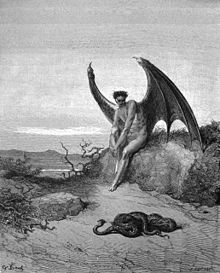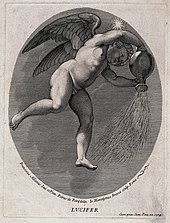Lucifer

As a name for the Devil in Christian theology, the more common meaning in English, “Lucifer” is the rendering of the Hebrew word הֵילֵל, hêlēl, (pronunciation: hay-lale)[1] in Isaiah[2] given in the King James Version of the Bible. The translators of this version took the word from the Latin Vulgate,[3] which translated הֵילֵל by the Latin word lucifer (uncapitalized),[4][5] meaning “the morning star”, “the planet Venus”, or, as an adjective, “light-bringing”.[6]
As a name for the planet in its morning aspect, “Lucifer” (Light-Bringer) is a proper noun and is capitalized in English. In Greco-Roman civilization, it was often personified and considered a god[7] and in some versions considered a son of Aurora (the Dawn).[8] A similar name used by the Roman poet Catullus for the planet in its evening aspect is “Noctifer” (Night-Bringer).[9]
Roman folklore and etymologyEdit
In Roman folklore, Lucifer (“light-bringer” in Latin) was the name of the planet Venus, though it was often personified as a male figure bearing a torch. The Greek name for this planet was variously Phosphoros (also meaning “light-bringer”) or Heosphoros (meaning “dawn-bringer”).[10] Lucifer was said to be “the fabled son of Aurora[11] and Cephalus, and father of Ceyx“. He was often presented in poetry as heralding the dawn.[10]
The Latin word corresponding to Greek Phosphoros is Lucifer. It is used in its astronomical sense both in prose[b][c] and poetry.[d][e] Poets sometimes personify the star, placing it in a mythological context.[f][g]
Lucifer’s mother Aurora is cognate to the Vedic goddess Ushas, Lithuanian goddess Aušrinė, and Greek Eos, all three of whom are also goddesses of the dawn. All four are considered derivatives of the Proto-Indo-European stem *h₂ewsṓs[19] (later *Ausṓs), “dawn”, a stem that also gave rise to Proto-Germanic *Austrō, Old Germanic *Ōstara and Old English Ēostre/Ēastre. This agreement leads to the reconstruction of a Proto-Indo-European dawn goddess.[20]







